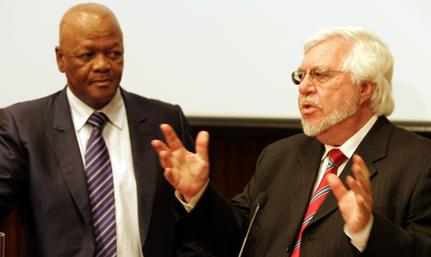Latest News Archive
Please select Category, Year, and then Month to display items
14 May 2024
|
Story ANTHONY MTHEMBU
|
Photo Supplied
 Contemporary artist Ibrahim Mahama engaging with students during his visit to the Department of Fine Arts at the University of the Free State (UFS).
Contemporary artist Ibrahim Mahama engaging with students during his visit to the Department of Fine Arts at the University of the Free State (UFS).
Ghanaian contemporary artist, Ibrahim Mahama, visited the Department of Fine Arts at the University of the Free State (UFS) to share insights with staff and students during his stay in the country.
Dr Adelheid Von Maltitz, Senior Lecturer in the Department of Fine Arts at the UFS, highlighted the significance of Mahama’s visit which took place from 21 to 28 March 2024, marking the first instance of such interaction between a Fine Arts department in South Africa and Mahama. She remarked, “It is truly astounding that a person of his calibre dedicated time to focus on our department, and I believe this has catalysed a positive shift within our department.”
Mahama’s impactful presence at UFS
Dr Von Maltitz emphasised that Mahama’s visit aimed to offer staff and students a glimpse into his artistic process and mindset. During his time at the UFS, Mahama, who was virtually overseeing his latest recent large-scale artwork titled Purple Hibiscus, which involved wrapping the Barbican Centre in London, engaged extensively with staff and students from the department about their research. He shared insights into his creative journey, presented select works, and conducted critique sessions with fourth year and postgraduate students, among other activities. Dr Von Maltitz believes this interaction, particularly with students, has significantly bolstered their confidence as aspiring artists, preparing them for professional endeavours.
Broader implications and future prospects
Mahama’s visit not only energised the department’s academic environment but also holds broader implications. Dr Von Maltitz asserted that it will solidify the department’s identity nationally and create avenues for students to pursue residencies in countries like Ghana. Therefore, maintaining a fruitful relationship with Mahama remains a priority for the department.
Reflecting on the visit Dr Von Maltitz concluded, ‘’the key takeaway, especially for the students, was witnessing the potential of their works within the broader South African and international contexts. “
Minister Jeff Radebe commends UFS for measures taken to address racial prejudices
2013-10-21
|
 |
| 18 October 2013 |
Mr Jeff Radebe, Minister of Justice and Constitutional Development, last night delivered a lecture in the Prestige series of the Dean: Faculty of Law, at the Bloemfontein Campus of the University of the Free State (UFS).
In a packed hall with, among others, university students, staff and members of the judicial system, Minister Radebe said that many other academic institutions should look to the UFS when they deal with the challenges of racism in its various manifestations in their midst. “I commend the university for taking drastic measures to address the challenges of racial prejudices in its own backyard,” he said.
“Government can and must provide leadership, but it is the collective efforts of all our people that will ensure that we bridge the racial and historical divides that stand in contrast to our noble virtues as entailed in the Constitution,” the Minister said.
On the topic “Access to Justice” the Minister said that the Department of Justice and Constitutional Development has channelled more than 80% of its nearly R16 billion budget to the Access to Justice programme.
Minister Radebe talked about the reintroduction of the Sexual Offences Courts, which attests to the unrelenting resolve to eliminate the scourge of gender-based violence. “Fifty-seven of the department’s Regional Courts are being upgraded to operate as dedicated Sexual Offences courts during the 2013/2014 financial year. We believe that these sexual offences courts will help address the growing challenge of sexual offences in the country, particularly against vulnerable groups.”
The Minister also pleaded with law teachers to avail themselves to preside in the courts in our country to complement the decreasing number of presiding officers that are drawn from the attorneys’ and advocates’ profession. These services are normally rendered by the Commissioners pro bono as part of an endeavour to bring justice to all the people, including the poor.
A challenge that the UFS could help resolve,is the transformation of the legal profession. “We need to increase the number of Law students and in turn increase the number of attorneys and advocates in the pool from which we derive candidate judges,” Mr Radebe said.
The Legal Practice Bill and the transformation of the State Legal Service are the most important initiatives underway by which the Institutions of Higher Learning will make a contribution. “The Bill seeks to establish a single regulatory structure, which will be responsible for setting the norms and standards for all legal practitioners. Members of the public, as primary beneficiaries of the legal profession, will also be represented in this structure. Other important objectives of the Bill are the removal of barriers of entry to the profession for young law graduates who aspire to pursue a legal career, and the introduction of measures aimed at ensuring that fees chargeable for legal services are reasonable and within reach of ordinary citizens,” he said.
The Minister concluded: “Our courts must reflect both the race and gender demographics of our country and so must the university communities in their various capacities as a microcosm of the society we seek to build.”